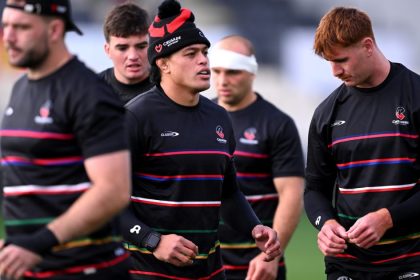These bridge dwellers are often looked down on by society and avoided by the church. The government has evacuated them, but offered no sustainable housing alternatives. As a result, they always return.
But, Church Under the Bridge welcomes them and provides spiritual guidance. Aside from building their Christian faith, Church Under the Bridge provides social welfare and counseling services. Eze said he also holds does spiritual outreach during the week.
Adebayo Samuel, 26, said the social welfare program of the church has been unique and impactful.
“Before joining this church, I usually sleep outside,” he said. “But since I’ve joined, I now stay in a house made of wood. I’m also doing cleaning now instead of site work.”
Samuel, who is also a recovering alcoholic and gambler, said he prays and meditates every morning, a dramatic change from his previous lifestyle. With the help of the church, he said he plans to continue his education and achieve his dream of being an engineer.
“Our goal is to build the image of Christ in them and it means that sometimes you have to be responsible for them in that sense,” Eze said. “Often times we have to get shelter for the homeless, job for the jobless, take care of pregnant women etc, it is a different kind of ministry.”
Toki Olalekan, 29, one of the founding members of the Church Under the Bridge and a recovering drug addict, added that the church has changed peoples’ lives.
“I see people that were low but when this church started, there are changes in them and I can see and confirm that there are changes in their life,” Olalekan said.
With 78 members, Eze said he doesn’t yet have of what more Church Under the Bridge wants to accomplish. He said he is following God’s lead. At the same time, challenges persist. Helping those who are left homeless means finding alternative housing and the cost of rent in Lagos limits what Eze dan do.
“The average rent for a single room in this area of Lagos state goes for between N250,000 [$163] to N400,000 [$261]. Imagine doing that for 70 people,” he said.
Eze also wants to collaborate with the local government to create low-cost housing options for his members.
At the same time, the high rate of drug abuse in Nigeria — ranging from narcotic and psychotropic substances — makes it easy for recovering addicts to relapse. Eze said a “rampant drug epidemic” has fueled the need for counseling and other services for his unhoused members.
Ikpemeawan said what Church Under the Bridge is doing is not a quick fix for vulnerable people, Instead, he said patience and consistent follow up with members are what has helped generate progress.
“The recovery for them is not just about stopping the drugs or finding a them a new place to stay,” he said. “It’s about rebuilding an entire sense of self. So, patience, support, community like the church is already providing and compassion — a sense of understanding is needed.”
Finding jobs for his members as a means to sustain financial independence has also proven to be a challenge.
“People see [our members] and find it difficult to trust them with jobs,” Eze added. “The few we’ve gotten jobs for, they are doing fine where they are, but it’s difficult to get them jobs.”
To mitigate this, Church Under the Bridge is currently building a temporary tent away from the bridge, where members will be trained on skills and crafts that can lead to self-employment. Eze said the project has stalled due to financial constraints.
“We are raising a temporary structure and I have spoken to facilitators who will come around and teach people how to make soap, how to make dresses,” Eze said.
For now, the Church Under the Bridge has brought hope, care and spiritual guidance to an otherwise rejected section of the society.
“I really hope the Church Under the Bridge can help me further my education so I can go or an engineering course and become something bigger,” Samuel said.




